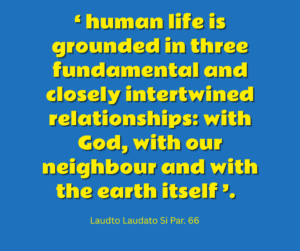Readings: Lev 25:1, 8-17; Ps 66: 2-3, 5, 7-8; Matt 14:1-12
‘Let none of you wrong his neighbour’. The line from the book of Leviticus looks to the land, dealings between people over the produce and provision for the Jubilee every fifty years which is to be declared ‘sacred’ with its inhabitants set free. The sounding of the trumpet ‘on the Day of Atonement throughout the land’ is not an air raid siren but a call to joy and thanksgiving for use of the land which is underpinned by so much more than its agricultural and actuarial value. The vision here is communal and caring, covering the earth also, an early version of the ecological ethic that Pope Francis expounded in his encyclical Laudato Siʹ, stating that ‘human life is grounded in three fundamental and closely intertwined relationships: with God, with our neighbour and with the earth itself’. (Par. 66)
In the Gospel reading it is not land but human life that is at stake. Earlier the evangelist expressed how King Herod had ‘sent and killed all the children in and around Bethlehem who were two years old or under’. (2:16). Contrasting him with Christ’s ‘quite different way of reigning’, Pope Leo XIV stated ‘Herod, for fear of being deposed, murdered children, who even today continue to be torn apart by bombs’.[1] Being born and reared in the hill  country had spared John’s life from that massacre; now he has become the target of a tyrant who, while he ‘regarded John as a prophet’, takes the line of least resistance in succumbing to the moral calculus of shame and saving face.
country had spared John’s life from that massacre; now he has become the target of a tyrant who, while he ‘regarded John as a prophet’, takes the line of least resistance in succumbing to the moral calculus of shame and saving face.
On the contrary the Psalmist prays, ‘O God, be gracious and bless us and let your face shed its light upon us. So will your ways be known upon earth’. God’s ways are written in the Word we hear and read today, ‘for you rule the world with justice’.
Kevin O’Gorman SMA
[1] Address of Pope Leo XIV to Participants of the “Reunion of Aid Agencies for the Oriental Churches (ROACO), 26th June 2025 (available at Vatican.co.za).

